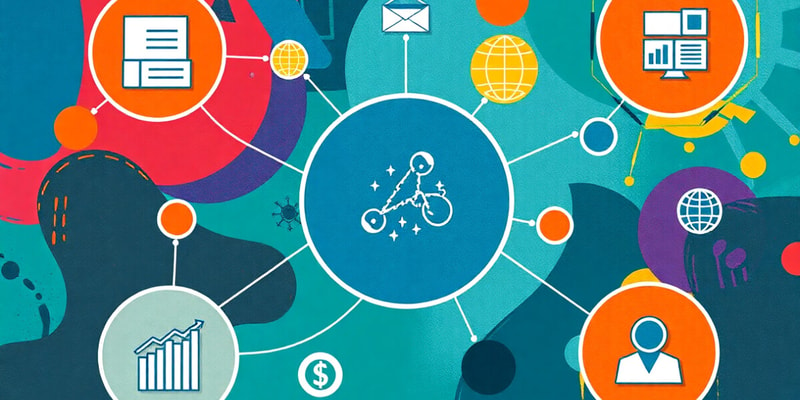Podcast
Questions and Answers
What is the main focus of administrative management?
What is the main focus of administrative management?
Planning, organizing, and overseeing administrative tasks to ensure efficiency within an organization.
What is the role of the administrative function?
What is the role of the administrative function?
It involves carrying out duties and responsibilities to support the organization's operations. This includes managing information, records, and communication.
What is the responsibility of an administrative manager?
What is the responsibility of an administrative manager?
They are responsible for supervising administrative activities and ensuring they align with organizational goals.
Which of the following is NOT a role of the administrative function within an organization?
Which of the following is NOT a role of the administrative function within an organization?
Signup and view all the answers
What type of information does top management need to make long-term decisions?
What type of information does top management need to make long-term decisions?
Signup and view all the answers
Is it the responsibility of the administrative manager to ensure that information is received timely?
Is it the responsibility of the administrative manager to ensure that information is received timely?
Signup and view all the answers
What is the relationship between systems, sub-systems, procedures, and methods?
What is the relationship between systems, sub-systems, procedures, and methods?
Signup and view all the answers
Which step of the systems development process involves assessing economic, technical, and operational viability?
Which step of the systems development process involves assessing economic, technical, and operational viability?
Signup and view all the answers
Which option best describes a transaction processing system (TPS)?
Which option best describes a transaction processing system (TPS)?
Signup and view all the answers
What is the key aim of document management?
What is the key aim of document management?
Signup and view all the answers
How does mail management contribute to effective communication?
How does mail management contribute to effective communication?
Signup and view all the answers
What is the primary purpose of forms management?
What is the primary purpose of forms management?
Signup and view all the answers
Which factor does NOT influence information flow in an organization?
Which factor does NOT influence information flow in an organization?
Signup and view all the answers
How does technology contribute to faster and more accurate information sharing?
How does technology contribute to faster and more accurate information sharing?
Signup and view all the answers
What is the primary benefit of having clear guidelines for information handling?
What is the primary benefit of having clear guidelines for information handling?
Signup and view all the answers
Which step of the document management cycle involves ensuring the accuracy and approval of the document's content?
Which step of the document management cycle involves ensuring the accuracy and approval of the document's content?
Signup and view all the answers
What is the intended purpose of a transaction processing system (TPS) in a retail store?
What is the intended purpose of a transaction processing system (TPS) in a retail store?
Signup and view all the answers
What are three prominent types of information found in organizations?
What are three prominent types of information found in organizations?
Signup and view all the answers
Give an example of how operational information is used in a manufacturing company.
Give an example of how operational information is used in a manufacturing company.
Signup and view all the answers
Why is financial information important in an organization?
Why is financial information important in an organization?
Signup and view all the answers
What is the role of strategic information in organizational decision-making?
What is the role of strategic information in organizational decision-making?
Signup and view all the answers
What are four personal attributes of an effective administrative manager?
What are four personal attributes of an effective administrative manager?
Signup and view all the answers
What is the importance of time management for enhancing value in administrative management?
What is the importance of time management for enhancing value in administrative management?
Signup and view all the answers
Describe the role of interpersonal skills in enhancing value in administrative management.
Describe the role of interpersonal skills in enhancing value in administrative management.
Signup and view all the answers
What is the purpose of problem-solving skills in administrative management?
What is the purpose of problem-solving skills in administrative management?
Signup and view all the answers
Why is technical proficiency important for an administrative manager?
Why is technical proficiency important for an administrative manager?
Signup and view all the answers
What is the main focus of conflict resolution skills in administrative management?
What is the main focus of conflict resolution skills in administrative management?
Signup and view all the answers
What is the primary purpose of a seminar?
What is the primary purpose of a seminar?
Signup and view all the answers
Name three factors that affect event organization.
Name three factors that affect event organization.
Signup and view all the answers
Why is understanding the audience important in event planning?
Why is understanding the audience important in event planning?
Signup and view all the answers
How does the venue impact event accessibility and logistics?
How does the venue impact event accessibility and logistics?
Signup and view all the answers
Study Notes
Administrative Management
- Administrative management focuses on planning, organizing, and overseeing administrative tasks to ensure efficiency within an organization.
- Administrative function involves duties and responsibilities supporting operations, handling information, records, and communication.
- An administrative manager is responsible for supervising administrative activities to ensure alignment with organizational goals.
Role of Administrative Function
- Facilitates communication and information flow.
- Ensures efficient management of records and documentation.
- Supports operational activities like scheduling, budgeting, and resource allocation.
- Manages compliance with policies, regulations, and procedures.
- Provides logistical support to various departments.
Information Needs of Top Management
- Top management needs strategic information for long-term decisions.
- This includes performance data, financial reports, and market trends.
- Information on compliance, risks, and legal obligations is crucial for effective leadership.
- Timely, accurate, and summarized information is key.
Administrative Manager Responsibility
- It's the administrative manager's responsibility to ensure timely information. (True)
Systems, Sub-systems, Procedures, and Methods
- Systems are collections of interrelated components operating toward a common goal.
- Sub-systems are smaller components within a system performing specific functions.
- Procedures are steps or instructions for achieving tasks within a system.
- Methods are techniques or approaches for implementing procedures.
Systems Development Process
- Problem identification: Defining the system's needed problem.
- Feasibility study: Assessing economic, technical, and operational viability.
- System design: Creating detailed designs and specifications.
- Development: Building and programming the system.
- Testing: Evaluating the system for errors and functionality.
- Implementation: Deploying the system for use.
- Maintenance: Updating and improving the system.
Transaction Processing System (TPS)
- A TPS handles business transactions, like purchases and payments.
- An example is a Point-of-Sale (POS) system in a retail store handling sales, updating inventory, and generating receipts.
Document Management
- Document management covers handling, storing, and securing organizational documents effectively.
Mail Management
- Mail management involves handling incoming and outgoing correspondence, ensuring timely communication.
Forms Management
- Forms management involves designing, controlling, and utilizing forms for collecting and organizing information.
Information Flow Factors
- Organizational structure: Centralized versus decentralized structures affect flow speed.
- Technology: Systems and software enable faster, more accurate sharing.
- Communication channels: Inefficient channels lead to delays.
- Employee skills: Skilled employees enhance efficient information processing.
- Policies and procedures: Clear guidelines ensure smooth information handling.
Document Management Cycle
- 1. Creation: Drafting or preparing the document.
- 2. Review and Approval: Reviewing and approving the content.
- 3. Storage: Storing the document securely in a physical or digital repository.
- 4. Distribution: Sharing the document with the intended audience.
- 5. Use: Utilizing the document for its intended purpose.
- 6. Maintenance: Updating or modifying the document as needed.
- 7. Archival or Disposal: Archiving or disposing of outdated documents.
Types of Information
- Operational information: Used for daily activities (e.g., schedules).
- Financial information: Related to financial transactions and reporting (e.g., monthly reports).
- Strategic information: Used in long-term decision-making (e.g., market analysis).
Administrative Manager Attributes
- Leadership: Guiding and motivating teams.
- Integrity: Maintaining ethical standards.
- Adaptability: Adjusting to changes and problem-solving effectively.
- Communication Skills: Conveying ideas and actively listening.
Enhancing Administrative Value
- Time Management: Prioritizing tasks effectively.
- Interpersonal Skills: Building relationships with colleagues and stakeholders.
Other Important Administrative Skills
- Problem-solving: Identifying and resolving issues effectively.
- Technical Proficiency: Familiarity with office tools and technology.
- Conflict Resolution: Managing disputes constructively.
Corporate Events
- Seminars: Professional training or knowledge-sharing events.
Factors Affecting Event Organization
- Budget: Determines the scale and available resources.
- Audience: Understanding their needs shapes the event format.
- Venue: Location affects accessibility and logistics.
Studying That Suits You
Use AI to generate personalized quizzes and flashcards to suit your learning preferences.
Related Documents
Description
This quiz covers the essentials of administrative management, focusing on planning, organizing, and overseeing administrative tasks. It delves into the role of administrative functions and the specific information needs of top management for effective decision-making.




